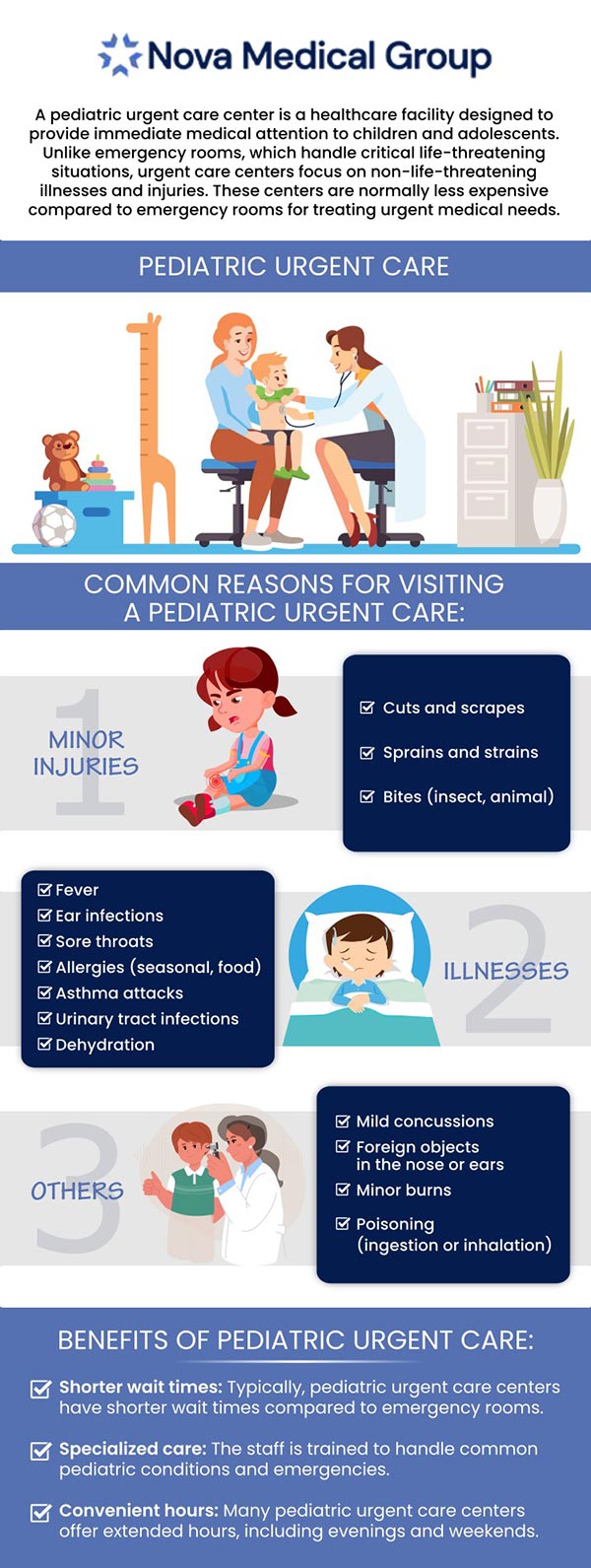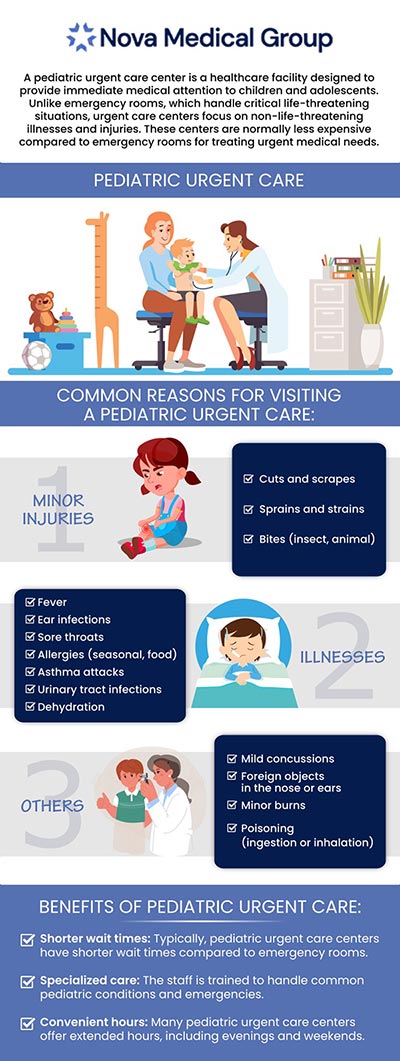What is the Difference Between Urgent Care, Primary Care, and the ER?
It’s important to understand when to seek care at primary care, urgent care, or the emergency room (ER). Knowing which service to use for your specific needs can save you time and ensure you get the appropriate treatment. Our team at Nova Medical Group helps guide patients on when to refer to a primary care provider, when urgent care is the best option, and when a visit to the ER is necessary. Understanding these distinctions can help you make informed decisions about your healthcare. Contact us today or book an appointment online. Located conveniently at 401 N Bedford St, East Bridgewater, MA, our pediatric urgent care is here to provide peace of mind when you need it most.


Table of Contents:
What is the main difference between urgent care, primary care, and the ER?
When should I go to urgent care instead of the ER?
What types of conditions are treated at urgent care centers?
Can urgent care replace my primary care doctor?
When it comes to healthcare, it’s essential to understand the different types of care available to ensure you seek the right service at the right time. Whether you’re maintaining overall health, dealing with an urgent issue, or experiencing a life-threatening emergency, knowing the difference between primary care, urgent care, and emergency services can help you make informed decisions. Here’s a breakdown of each service:
• Primary Care: Primary care focuses on long-term health management, including routine check-ups, chronic condition management, and preventive care. Primary care physicians establish ongoing relationships with their patients, enabling them to monitor medical histories and provide personalized care. They also handle referrals to specialists and manage vaccinations, screenings, and general health concerns.
• Urgent Care: Urgent care facilities are designed for non-life-threatening conditions that require prompt medical attention, such as minor fractures, sprains, cuts, or infections. Urgent care centers offer extended hours and do not require appointments, providing an accessible option when primary care offices are closed. Urgent care centers often provide quicker and more affordable treatment than emergency rooms, focusing on timely, effective care.
• Emergency Services: Emergency rooms are equipped to handle severe, life-threatening conditions such as chest pain, severe bleeding, difficulty breathing, or traumatic injuries. These situations require immediate, intensive medical attention that can only be provided in an ER setting. Understanding when to seek emergency care is crucial for ensuring that patients receive the appropriate level of care when needed.
By recognizing the roles and distinctions between primary care, urgent care, and emergency services, you can better navigate your healthcare needs and receive the most effective treatment for your situation.
When seeking medical care, understanding whether to visit Nova Medical Group’s urgent care clinic or head straight to the emergency room (ER) can be crucial for receiving the appropriate level of treatment. Nova Medical Group’s urgent care facilities are designed to address non-life-threatening conditions that require prompt attention, especially when you are unable to secure an immediate appointment with your primary care provider. Consider visiting urgent care for issues like minor fractures, sprains, or strains, as well as ailments such as the flu, mild asthma attacks, skin rashes, and minor cuts requiring stitches. Urgent cares are also well-equipped to manage common infections, including urinary tract infections, earaches, or sore throats, particularly if these arise outside regular office hours.
Conversely, the ER is best suited for severe or potentially life-threatening conditions that demand immediate and intensive treatment. Situations necessitating a visit to the ER include symptoms indicative of a heart attack, such as chest pain or difficulty breathing, and signs of a stroke, including sudden numbness or weakness, confusion, or difficulty speaking. Severe head injuries, uncontrolled heavy bleeding, deep wounds, and major burns also warrant a trip to the ER. Additionally, intense abdominal pain, particularly if accompanied by fever or vomiting, and any significant traumatic injuries from accidents should be promptly assessed in the emergency room.
Choosing between Nova Medical Group’s urgent care clinic and the ER can ensure you receive timely and appropriate medical attention while also contributing to the efficient use of healthcare resources. If you are ever uncertain about which option to choose, it is advisable to prioritize caution by seeking emergency care or consulting with a healthcare professional at Nova Medical Group over the phone for guidance on the best course of action.
Urgent care centers are designed to provide quick, efficient medical care for non-life-threatening conditions that require immediate attention. They serve as a convenient option for patients who need prompt treatment without the long wait times associated with emergency rooms. Here are some of the conditions commonly treated at urgent care centers:
• Minor Injuries: Urgent care centers are equipped to handle injuries like sprains, strains, simple fractures, cuts requiring stitches, sports injuries, and minor burns. These centers offer timely treatment without the need for an emergency room visit.
• Respiratory Issues: Common respiratory conditions such as colds, flu, bronchitis, and mild asthma attacks can be treated at urgent care centers. Many locations also offer testing and treatment for conditions like strep throat, sinus infections, and ear infections.
Gastrointestinal Concerns: Issues like nausea, vomiting, diarrhea, and dehydration can be managed at urgent care centers, providing immediate relief and treatment for underlying causes.
• Skin Conditions: Minor skin problems such as rashes, insect bites, and allergic reactions can also be addressed at urgent care centers, ensuring timely care for a range of dermatological issues.
• Preventive Services: In addition to treating acute conditions, many urgent care centers offer preventive services such as physical exams, vaccinations, and routine screenings.
Urgent care centers provide an accessible and cost-effective alternative to emergency rooms for a variety of medical issues, making them an important resource for individuals in need of immediate but non-emergency care.
When considering healthcare options at Nova Medical Group, it’s essential to understand the distinct roles of urgent care services and primary care physicians, both of which are integral to comprehensive healthcare. We offer urgent care to provide immediate medical attention for non-life-threatening conditions—such as minor injuries, infections, or illnesses like the flu—ensuring convenience and accessibility with extended hours and no need for an appointment.
However, the role of a primary care doctor is crucial for your long-term health management. Our primary care physicians are dedicated to preventive care, managing chronic conditions, and offering personalized advice tailored to your medical history. By developing an ongoing relationship with you, our primary care doctors gain a deeper understanding of your overall health, effectively coordinate care with specialists, and meticulously track your medical records and vaccinations.
While Nova Medical Group’s urgent care services efficiently address immediate health concerns, they are designed to complement, not replace, the continuity and personalized approach of primary care. Solely relying on urgent care could lead to fragmented care and might not provide the preventive services necessary for optimal health. Therefore, maintaining a relationship with a Nova Medical Group primary care provider ensures a holistic approach to your health, focusing on both immediate and long-term wellness.
Our comprehensive care model prioritizes your overall well-being, making sure you have access to the right care at the right time. Contact us today or book an appointment online to consult with our expert team and start your journey to better health. We are located at 401 N Bedford St, East Bridgewater, MA 02333. We serve patients from East Bridgewater MA, Abington MA, Brockton MA, West Bridgewater MA, Easton MA, Taunton MA, Raynham MA, and surrounding areas.


Additional Services You May Need
▸ Urgent Care
▸ Primary Care
▸ Women’s Health
▸ Weight Management
▸ Diabetes Management
▸ High Blood Pressure
▸ Sports Medicine
▸ Specialty Services
▸ Occupational Health
▸ Adult Primary Care
▸ Pediatric Primary Care
▸ Geriatric Primary Care
▸ Fractures/Burns/Cuts
▸ Annual Physicals
▸ Hereditary Cancer Risk





